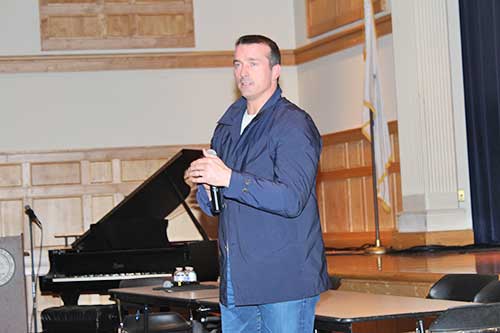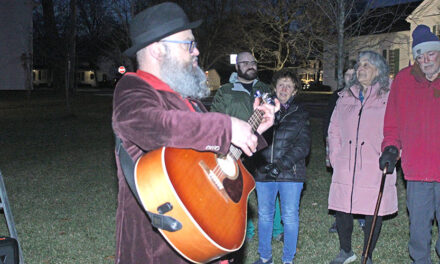Published in the March 14, 2018 edition
By DAN TOMASELLO
LYNNFIELD — The stigma surrounding substance abuse needs to change and more education is needed, former NBA player Chris Herren told 200 parents and community members Monday at the middle school.
The School Department brought Herren to town to give a community-wide presentation as part of an effort to educate townspeople about substance abuse and risky behavior. Herren previously presented to Lynnfield High School students on two separate occasions, including last spring.
“For the last seven years, I have dedicated my life to traveling all across the country to share my story,” said Herren. “I do this for many reasons. I think we have gone horribly wrong and have completely dropped the ball. I think we put too much focus on the worst day and forget about the first day.”
Herren was a star basketball player at Durfee High School in Fall River, where he was a McDonald’s All-American. He said his battles with addiction began when he started drinking at the age of 14.

FORMER NBA PLAYER Chris Herren discussed his battle with addiction during a community presentation in the Lynnfield Middle School auditorium on Monday. (Dan Tomasello Photo)
“That was the first major red flag that went up in my life and that was the first of many that went unaddressed,” said Herren.
After high school, Herren decided to go to Boston College. During his freshman year, he tried cocaine for the first time in his dorm room.
“I had no idea that one line would take 14 years to walk away from,” Herren. “I had no idea I would get kicked out of Boston College for three failed drug tests four months later. It caused me to lose my scholarship and I got sent back home to live with my mom. I had no idea I would wake up the next morning with my mom crying at the kitchen counter. At 18-years-old, I was labeled a drug addict.”
Herren said former Fresno State University basketball head coach Jerry Tarkanian offered to give him a second chance and he jumped at the opportunity.
“But I had no idea that one line of cocaine was coming with me,” said Herren.
After scoring 30 points against number one ranked Duke University, Herren spent the night drinking and doing drugs at a nightclub. The next day, Herren said his trainer called him and told him he had to take a drug test. Full of guilt and regret, Herren told his trainer and athletic director he spent the night drinking and doing drugs. Fresno State subsequently called a press conference, where Herren admitted to being a drug addict on national television.
“At 21, I sat down at a table, looked into the cameras and cried on national TV,” said Herren. “What most people don’t know is I cried because my mother and 80-year-old grandfather walked into the room. They were so proud of me that they wanted to surprise me, and instead they were walking into a press conference. After that press conference, my mother cried while taking me to the airport.”
Herren checked himself into a drug treatment program in Salt Lake City, Utah. However, Herren said he “blew the biggest opportunity of my life” while in rehab.
“I walked out of there with nothing because I believed I was better,” said Herren.
After completing his senior year at Fresno State, Herren was drafted by the Denver Nuggets in the second round of the 1999 NBA Draft. He said he was surrounded by supportive teammates who worked diligently to help him stay sober.
“My rookie season was the best I ever had playing basketball,” said Herren.
Herren bought a home in Fall River after his rookie year and started settling down with his wife and son. While sitting at home one night, Herren bought Oxycontin from a childhood friend for the first time.
“I had no idea that decision would change my life forever,” said Herren. “I had no idea that 40 milligram pill would turn into 1,600 milligrams a day. I had no idea the $20 I spent would turn into a $25,000 a month Oxycontin habit.”
Herren “went through his first detox” at the beginning of NBA training camp. While going through withdrawals, Denver traded Herren to the Boston Celtics.
“It should have been my dream come true,” said Herren. “I pretended to be a Celtic in the driveway and I waited my whole life for that phone call. But honestly, I knew in my heart that was a nightmare beginning.”
After Herren’s season with the Celtics ended, he resumed his basketball career in Italy. He smuggled $24,000 worth of Oxycontin into Italy when his family relocated.
“Those Oxycontin were in there with the best intentions,” said Herren. “I met with a doctor in Boston and we put it down in paper how every single day I would cut my milligrams down. I thought I would break free from this monster in five months. Unfortunately, Oxycontin and Percocet don’t play that way and I ran out of the 300 pills in three weeks.”
While going through withdrawals in Italy, Herren tried heroin for the first time.
“At 24 years old, I became an intravenous drug addict,” said Herren. “I never went back to the pills.”
Herren’s addiction to heroin ended his basketball career in Italy and he moved to Rhode Island, where he bought heroin every morning in a Dunkin’ Donuts parking lot. After one of his visits, Herren overdosed while driving and was arrested when he was 24. He made one phone call after making bail.
“I didn’t call my mom and dad to ask for help,” said Herren. “I didn’t call my wife to say sorry. My first phone call was to the man I met in the parking lot that morning because what he sold me was so good it almost killed me. That’s how sick it really gets. Every single day you take a chance at dying.”
Herren was addicted to heroin for seven years and overdosed four times. He became a “street junkie” after losing everything.
“I bounced checks and robbed family,” said Herren.
After his fourth overdose, Herren contemplated suicide because he “wanted to end this nightmare.” After another stint in rehab and another relapse, Herren became sober on Aug. 1, 2008. He said the birth of his third child and his family led to his sobriety.
“Aug. 1, 2008 is my sobriety day,” said Herren. “I have been given countless blessings and gifts, but the greatest gift I have ever been able to give is that for the last nine-and-a-half years I have been the dad I wish I had.”
Herren noted a number of children have asked him if his children have abused alcohol and drugs.
“They have chosen not to, but it doesn’t mean they won’t,” said Herren. “But if they do, I won’t be like my mom and dad and look away. If they do, I will walk into their bedroom and tell them how much I love them. And then I am going to ask them one question. Please tell me why?”
Herren said his goal for the presentation was to educate parents about addiction.
“I really believe we failed our children,” said Herren. “People often ask me ‘60,000 people died last year from a heroin overdose. What would you do to change that?’ I would make wellness a core class on Day One. Why are we teaching our children about drugs and alcohol in their health class for three months during their sophomore year? There are parents in here who apply pressure on their children academically. There are parents in here who apply pressure on their children athletically. But they are nowhere on a Friday or Saturday night to help their children socially when they need mom and dad the most.”
Q&A
After Herren finished telling his story, he participated in a question and answer session with parents.
A parent in the audience asked Herren how his presentations to students differ from ones given to parents.
Herren said he has begun sharing other children’s stories during school presentations. He has developed a friendship with a 25-year-old woman he met while giving one of his school presentations. He said the woman has been emailing him monthly for the past seven years.
“The fact she is happy and thriving in her life means more to me than anything I have ever accomplished as a basketball player,” said Herren.
In response to a question from a mother about social anxiety, Herren said teenagers often use alcohol and drugs to deal with social interactions.
“There is a whole bunch of parents who have done the same thing but you have yet to speak to your children about that,” said Herren. “Your first party and your first kiss, some of you were drunk just like me to get through it. I believe the lack of wellness in school systems makes people uncomfortable about it, so everyone ignores it. I believe we need to challenge our children socially.”
A father asked Herren how can people change the culture of shaming people suffering with addiction.
“There are so many reasons for this stigma,” said Herren. “When we are healthy, we are clean. When we are really sick, we hit rock bottom. There are so many nasty words around this that are completely unnecessary. I could walk into a student presentation and say to the students ‘bring me a picture of a drug addict.’ Ninety-nine percent of the people in the school would bring a picture of a person in the final stage of their life. They never bring a picture of the first day.
We have done a horrible job framing addiction to our children.”
A mother in the audience said Herren doesn’t appear to be a recovering addict.
“I know attorneys, doctors, judges, pilots, athletes and actors who struggle with heroin,” said Herren. “The face of heroin is completely different than it was 30 years ago. That’s the truth and that’s the scariest thing about it now. No neighborhood is safe. I don’t care how nice your house is, how much money you make or where you work. Heroin will kick open your front door.”
After Herren concluded his presentation, he was given a standing ovation.




